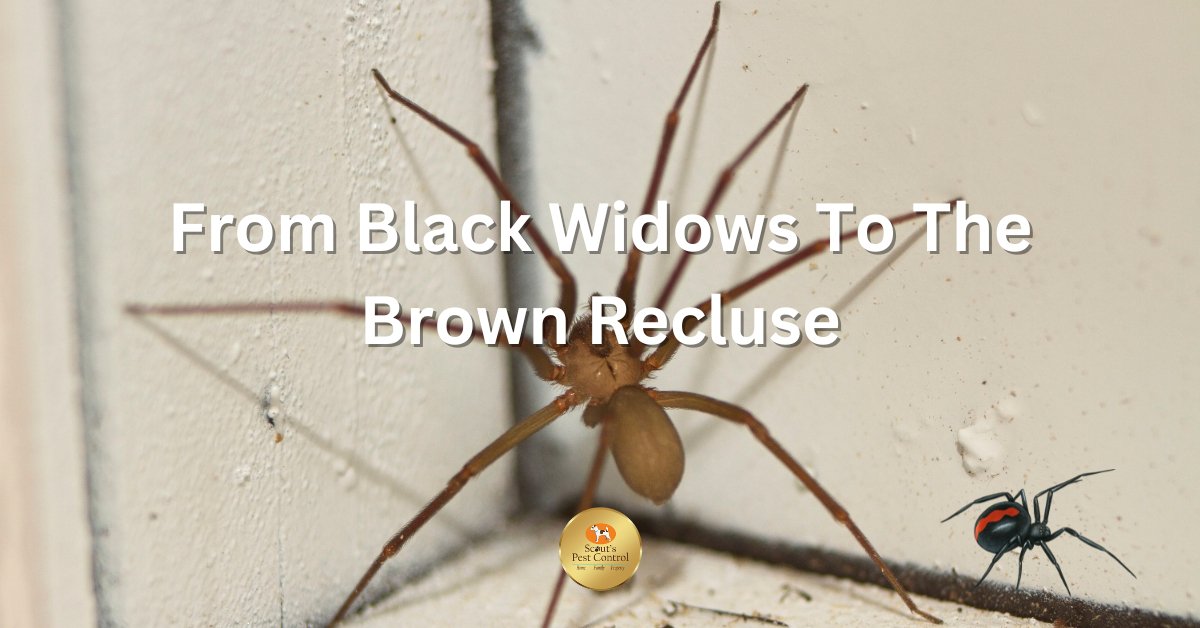Spiders scare people. They have a bad reputation, especially because of horror movies and scary stories that make us fear them. But perhaps we do not know enough about them. No matter where you reside in South Carolina, be it in the vibrant cities or peaceful suburban homes, one thing is certain: you’re bound to encounter some of the state’s eight-legged residents. South Carolina’s warm and humid climate is perfect for many types of spiders, like the well-known Black Widows and Brown Recluses. But don’t let these notorious names scare you away.
To coexist peacefully with these creatures, it’s important to understand their behavior, habitats, and unique characteristics. This knowledge will help ensure that they don’t become a nuisance in your home. Spiders bring a wealth of benefits to the environment, but you should not allow them to over run your home, which can happen fairly quickly.
Understanding the Spiders You Should Be Aware of in South Carolina

Among the spider species found in South Carolina, Black Widows and Brown Recluses are two that are most deserving of attention due to their potential health risks. It’s important to note, though, that these spiders are, by nature, non-aggressive and will only bite humans in self-defense. Therefore, if you disturb their habbitat, then you could find yourself with a problem or if you do not take precautions, you could have a problem. Either way, knowledge will help you make the right decisions when it comes to protecting your home and family from questionable arachnids.
Dangerous Spiders In Our State
Black Widows: Female Black Widows can be easily recognized by their iconic image: a glossy black spider with a striking red hourglass marking on the underside. They are known for their potent venom, which, while rarely lethal, can cause severe discomfort. Black Widows typically make their homes in dark, undisturbed areas such as woodpiles, sheds, and under rocks. They also love to be inside your garage area or crawl space if you give them the right environment in which they will survive and thrive.

Brown Recluses: This spider is perhaps the one that is less known than the black widow but far more dangerous. These spiders are identified by their uniformly light-to-medium brown color and a distinct dark violin-shaped mark on their back. This is why they are also known as the fiddle spider. Brown Recluses are less common than Black Widows, but their bites can cause serious medical conditions if not treated quickly. One bite can cause severe necrosis in an individual and this can be a very costly lesson. They prefer hiding in warm, dry, and dark environments. This could be your home.

Spider Life Cycle and Behavior
Understanding the spider life cycle and behaviors can provide valuable insights for homeowners looking to keep their homes spider-free. Spiders undergo three stages in their life cycle: egg, spiderling, and adult. The majority of spiders in South Carolina lay their eggs in the fall, which hatch in the spring.
Most spiders are solitary creatures, focusing on their individual survival rather than operating as part of a community. They are predators by nature, typically feasting on insects and other spiders. Their hunting techniques vary; some are web builders who wait for prey to become ensnared, while others are active hunters.
Coexisting with Spiders
Perhaps the most crucial thing to remember about spiders is their pivotal role in the ecosystem. As predators, they contribute to controlling insect populations, which could otherwise grow out of hand. While it is understandable to desire to exclude them from your household, it is equally important to acknowledge and preserve their role in the ecosystem.

The key is to balance our desire for a spider-free home with the ecological benefits these creatures provide. With knowledge about South Carolina’s spiders, good home maintenance, and, professional pest control help, you can successfully achieve this balance. And who knows? Over time, you may begin to appreciate these fascinating creatures for their important role in maintaining the biodiversity and prosperity of our world, including South Carolina.
Debunking the Spider Season Myth
Let’s dispel one of the most misunderstood myths about spiders. The common myth that circulates around the internet, around water coolers, and in our everyday conversations is that spiders flock into homes during winter or cold weather to escape the chill. But is there any truth to this? The answer, in fact, might surprise you.
Contrary to popular belief, spiders don’t necessarily seek out your home for warmth in cold weather — they’ve likely been there all along. Most of the spiders you encounter indoors, even in winter, are species that have adapted to indoor life and are not common outside your home. They’re part of a group known as house spiders and, for them, your home is their natural habitat. These spiders include the American House Spider, the Long-Bodied Cellar Spider, and the Common House Spider.

Spiders and Seasons
Spiders are cold-blooded creatures. Instead of seeking warmth, they often slow down and become less active when temperatures drop. Many species will build up their food stores to survive the winter. Some spiders even produce a sort of “antifreeze” that protects their bodies from freezing.
Instead of coming in from the cold, spiders that you see more often in your home during winter have likely been hiding out of sight for months. As the season changes, their behavior might change — pushing them to venture out or surface in areas you frequent, making them seem more abundant.
Also, some spiders will mate and reproduce in late summer and fall. This means that by winter, more spiderlings have grown enough to be noticeable — again, making it seem like there’s a sudden spider invasion.
Integrated Pest Management (IPM) Approach
An Integrated Pest Management approach allows homeowners to effectively deal with spider populations. This includes four main steps:

- Identify the pest: Know if the spider is a harmless or a potentially harmful species.
- Learn about the pest’s life cycle and behavior: This will allow for a more targeted and effective pest management strategy.
- To prevent issues, follow these steps: keep your home clean, remove clutter, seal gaps and cracks, and regularly check hidden areas for any problems.
- In case you come across a hazardous spider, it is advisable to get in touch with Scout’s Pest Control for professional assistance. We have the expertise to safely remove the spiders and ensure they don’t re-infest your home.
Mitigating Spider Encounters
To mitigate spider encounters in your home all year round, implement proactive pest control measures. Keep your space clean and uncluttered to eliminate possible hiding spots. Inspect boxes, bags, or other items before bringing them inside since these can unknowingly transport spiders into your home. Regularly vacuum under furniture, in corners, and other areas where spiders might lurk. When you are working in your garage or in your garden, make sure you wear protective gloves.
Remember, spiders are often beneficial, helping to control other pests by preying on them. The occasional spider sighting in your home isn’t usually cause for concern. If you see many spiders or encounter a potentially dangerous type, it’s a good idea to call pest control experts.
Understanding the misconception about spiders coming inside during cold weather can help homeowners better deal with these creatures. Knowing that spiders are not invaders, but rather co-inhabitants, we can shift our focus from unnecessary concern to discovering how to coexist harmoniously with these crucial members of our ecosystem.





